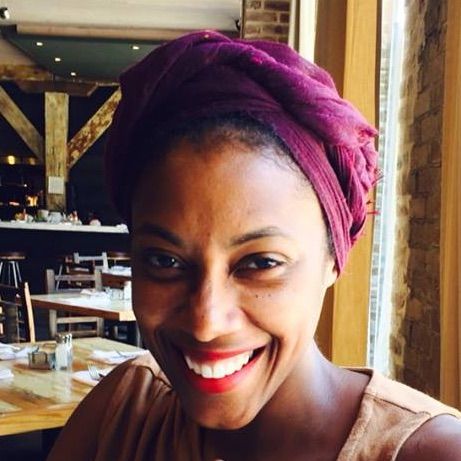All Hail Regina King
The actress is finally getting her long-overdue due: a shelf of awards, a production deal, a film directorial debut, and now a superhero role in HBO’s fantastical Watchmen series.
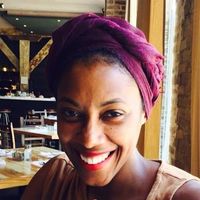
People say the eyes are windows to the soul, but Regina King says it's the teeth. Mine are the first thing she notices. “You got some lipstick here,” she says, gesturing at her own front teeth. “My desire to be a career actor was not always my desire,” she tells me. “I thought I was going to be a dentist. It’s funny because I’ve dated only one guy with not-so-great teeth, and I dated him for a minute. I never said anything, and after we broke up, he gets his teeth fixed.” We’re taking a walk at Lake Hollywood and stop on the path to cackle. “I run into him and he’s wearing Invisalign.”
I’m not acting worshipful, but I’m most certainly in awe, having watched her ever since she was 13 and playing bookish, wise-cracking teenager Brenda Jenkins on the late-’80s sitcom 227, about a D.C. family. Back then, I wanted Brenda’s hairstyle so bad. Now, three decades later, King leads HBO’s Watchmen, premiering October 20, playing a character so multivarious (a black girl born in Vietnam, a kind of megahero) and genre-bending that she is hard to summarize. “Sister waited until she was almost 50 to be a superhero,” King says, racked and bent, laughing. “It’s something I’ve always wanted to do, you know, be a woman physically kicking ass.”
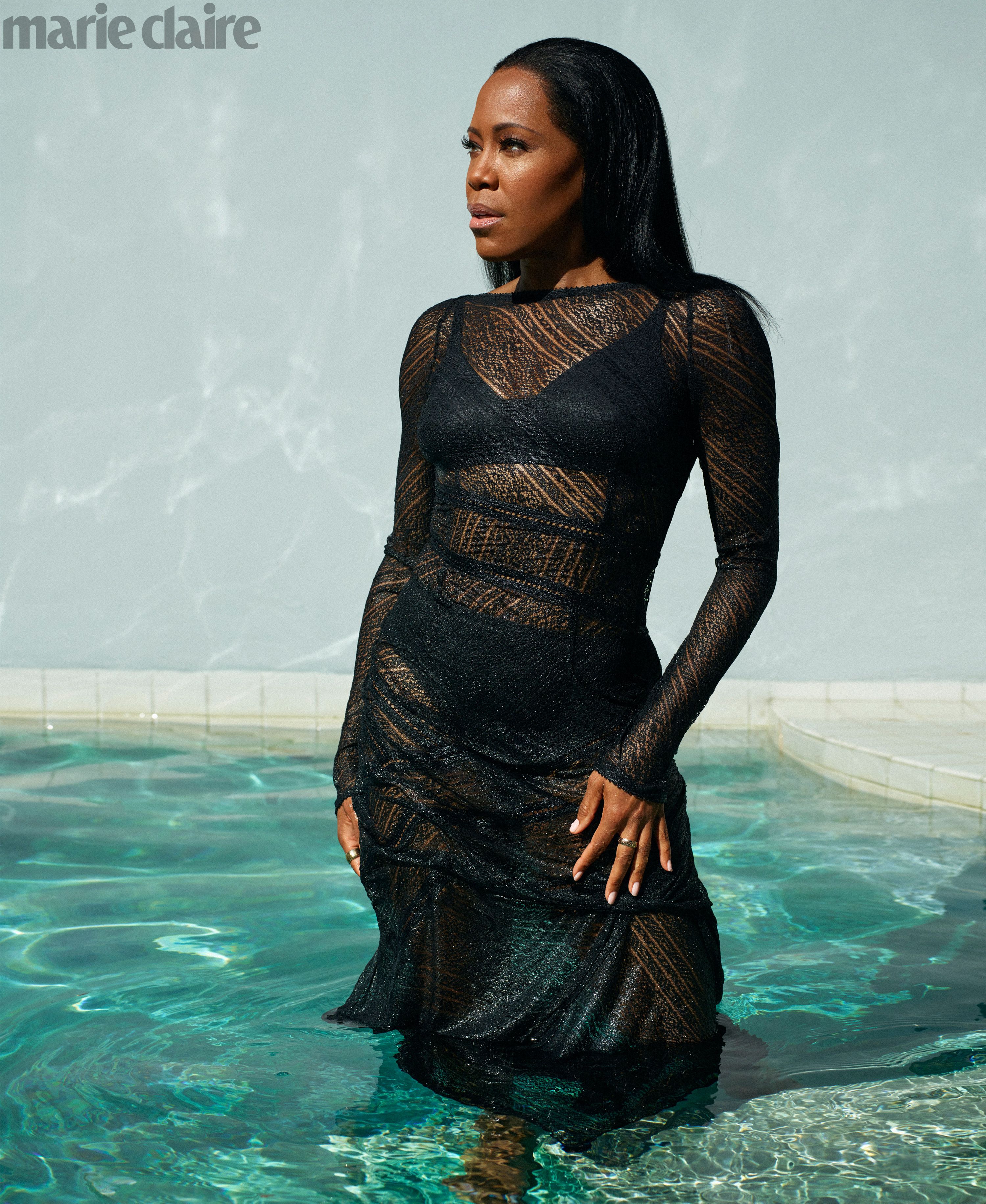
Antonio Berardi dress, Chanel Fine Jewelry rings.
Watchmen, created by Damon Lindelof (Lost, The Leftovers) and based (distantly) on the groundbreaking 1986 politically driven graphic novel by Alan Moore, is a strange and tantalizing world; think The Conformist, Children of Men, Blade Runner, and Rihanna. (HBO describes it as a world where super-heroes are considered outlaws.) The pilot of the nine-episode series is a visual escapade: It begins with a silent film, then crashes into Black Wall Street and the 1921 Tulsa Race Massacre (when white residents incinerated black-owned businesses and homes and killed, historians now estimate, as many as 300 people) before landing in 2019, when the viewer is transported to a musical on an English manor. Then, as a kind of hat tip to fans, we see character Dr. Manhattan on Mars, which is where the original comic left him. Lindelof’s Watchmen remains political commentary, but he takes creative liberties that expand the original world in surprising ways, including the addition of King’s cop character, Angela Abar, who sometimes becomes Sister Night. Within the one episode, we lurch among all these worlds. “Character is how you hang it all together—and Regina,” says executive producer Nicole Kassell, who directed the pilot. “She’s the most humble, real, grounded, soulful person. She happens to also be a star. I can’t believe I’m that lucky that I get to work with a woman of both that talent and humanity.”
“Great actors evolve what’s on the page, or they challenge it or push it beyond its limits. That’s what Regina does with the character,” says Lindelof. Thing is, he never thought he’d get King. “The days of Regina King doing television, acting in someone else’s TV show, are over,” he says he figured. He called her anyway, they met for dinner, and by the end, “she was like, ‘Let’s take this leap together.’ We wrote the pilot, watched the pilot, and then Regina's performance started to inspire us as to what to do next.”
Regina René King was born in Los Angeles in 1971. Her mother, Gloria, was a books-obsessed teacher, "granola," King calls her, whose children were not allowed cereal with food coloring and ate kale before it was a T-shirt slogan. Gloria encouraged her two daughters—Regina is four years older than Reina—to be artists. Or at least to experiment. “My mom allowed us to take any art we wanted to take, if she could afford it, but we had to finish it out.” In fact, Regina can think of only one time in life that she quit something (the accordion).
They were the kind of family that had tickets to the musical Timbuktu! starring Eartha Kitt, which King saw at about seven years old. How could young Regina ever forget the way Kitt came down into a split and said in that unplaceable drawl, “I am here...Welcome to Timbuktu!” King mimes the motion, gasps at the memory. “This is everything, I remember thinking. I want to feel like this and make people feel like this. I wanted to be part of this feeling over and over again.” It wasn't that she knew she wanted to act, per se, but she understood how she wanted to be in the world. King has a solid philosophy on living that she articulates and takes pains to carry out. Part of that has to do with what it means to be an actor, but much of it is about being a good person: decisive, with boundaries, taste, and the means to choose. She does not hang on to things, does not live forever in a single moment, even the best ones. “What’s next, you know? I’m very good at choosing what needs to stay with me and what things need to be let go of. Sometimes we can get so caught up in the moment and we don’t ever leave that moment, and that’s how some people get stuck. I don’t know if you ever heard me say, ‘Comfort zones are where dreams go to die.’”
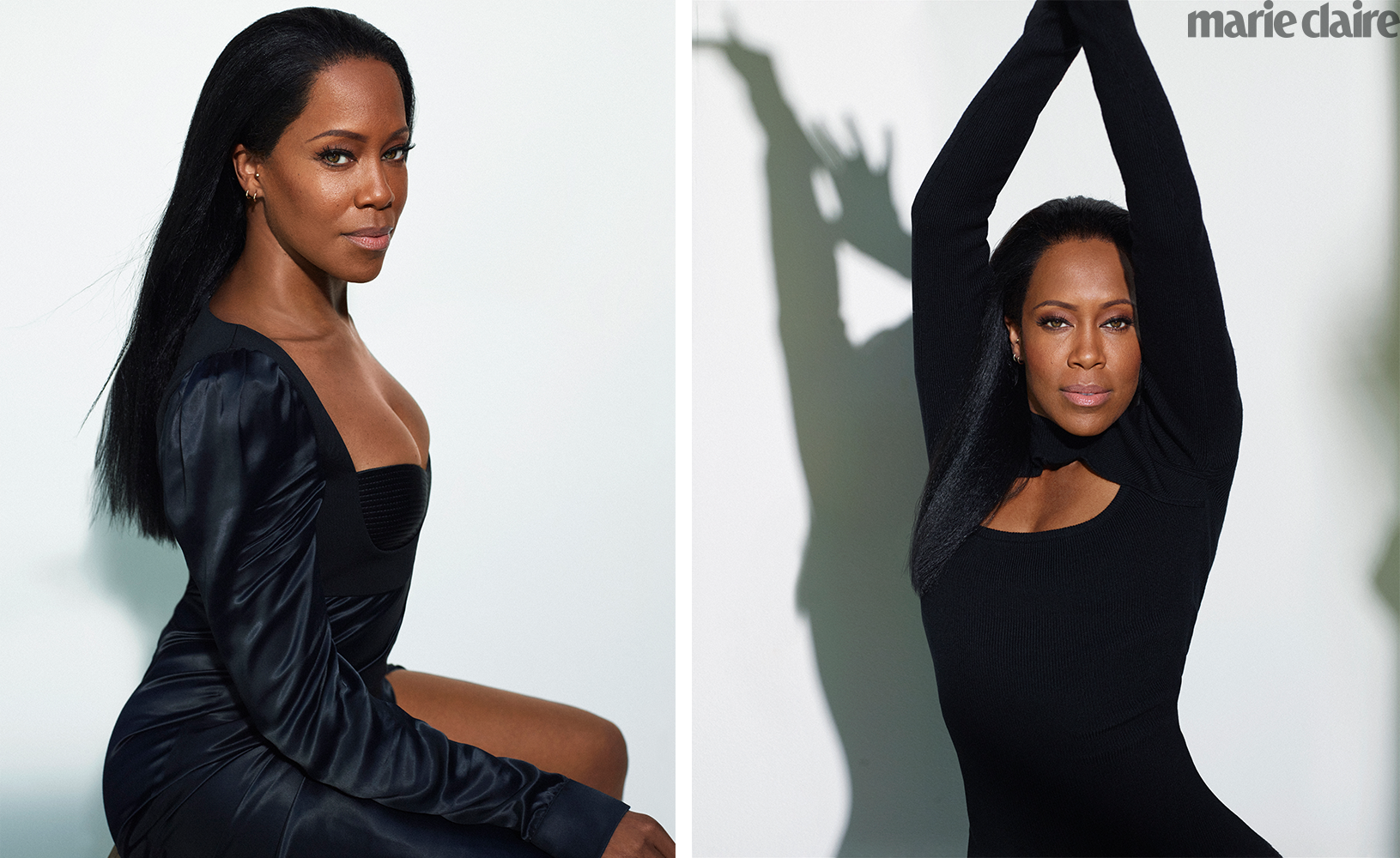
Left: Versace dress and Mateo New York earrings. Right: Victor Glemaud dress.
After seeing Kitt on stage, King took acting classes with coach Betty Bridges (Todd Bridges’s mother), her parents divorced, and she and Reina were bused from the Windsor Hills neighborhood where they lived to the beach schools where their teachers were people like Natalie Cole’s first cousin and the opera soprano Kathleen Battle’s aunt. Her mother believed thinking attracted your fate, so if bad things happened, change your thoughts, which is an idea that didn’t seem as interesting as it would after King became a mother to her son, Ian, now 23. (King was married to Ian’s father for nine years before divorcing him in 2007.) “When that’s your beginning, you’re never really focused on the possibility of impossibility,” she says. “What my mother filled us with, what she gave us, it feels natural and so intuitive. The Secret was never a secret for me,” she continues, referring to the 2006 mega hit self-help book based on the belief that visualizing your thoughts can make them reality.
Get exclusive access to fashion and beauty trends, hot-off-the-press celebrity news, and more.
It’s easy to underestimate what it has taken for King to thrive—as a black woman, actor, director, and producer—in Hollywood. It’s human nature to try to condense an unwieldy 34 years of acting talent and endurance into a media-friendly “moment.” That’s 34 years of stealing the screen (large and small), of never playing any role the same way twice, of doing voice-overs for two characters in the same show (The Boondocks), of winning no major awards for the large majority of those years and then suddenly earning them in rapid succession: Emmys in 2015 and 2016 for ABC’s American Crime, another Emmy in 2018 for Netflix’s Seven Seconds, a 2019 Academy Award and Golden Globe for If Beale Street Could Talk.
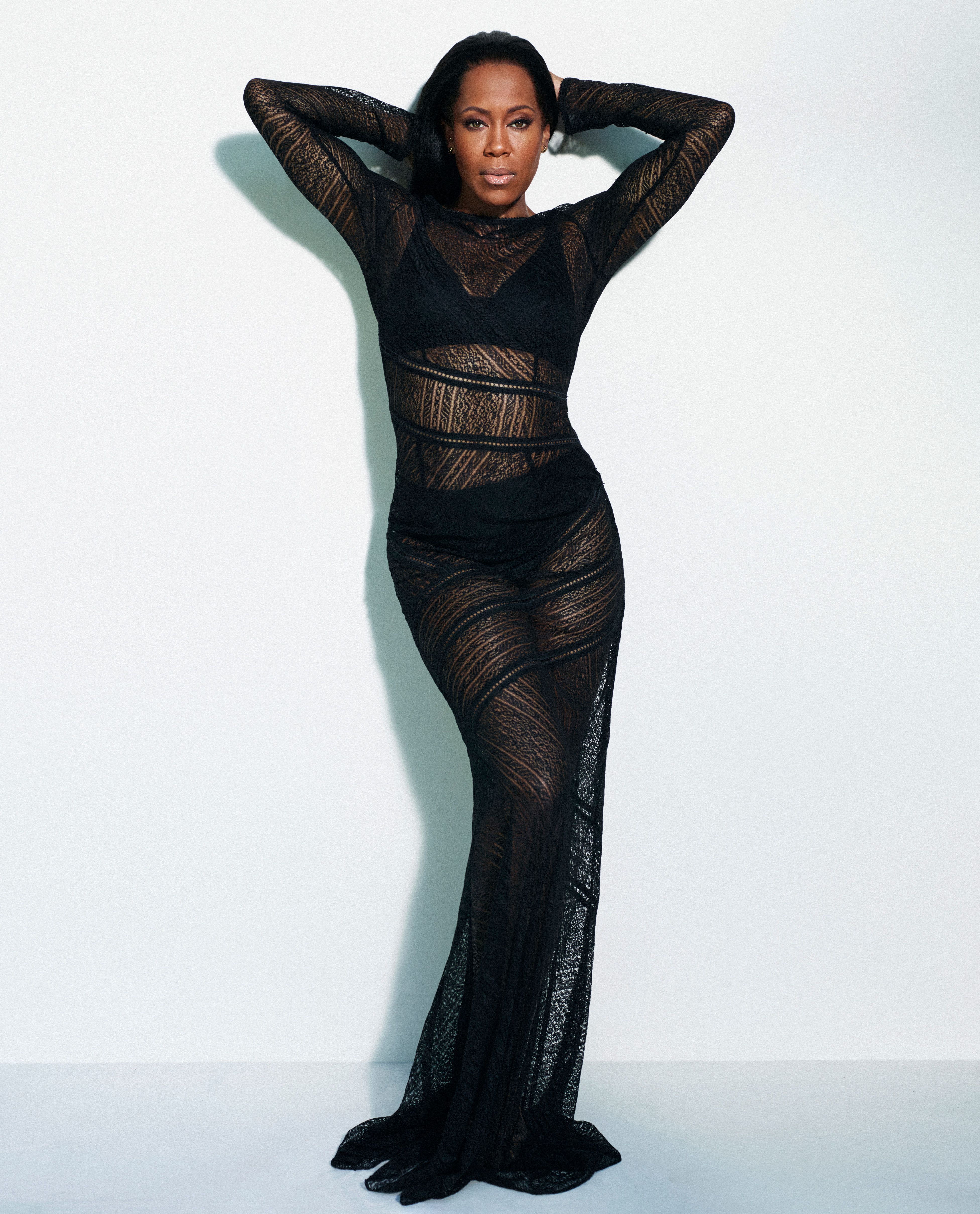
Antonio Berardi dress, Chanel Fine Jewelry rings.
Seven Seconds, about a mother who loses her son to police violence, was by far the most challenging thing she has ever done. King kept thinking about her own son. There is a moment when her character, Latrice Butler, sees her comatose son lying in a hospital bed. The camera stays on King, and we know through her wordless performance what Latrice’s eyes have taken in. It’s one of my favorite King performances ever, full of nuance. She still texts with a mother she consulted for the role whose son was killed by a police officer. “I was tired a lot. I was worn. That was the biggest, deepest dive I’ve ever had to take.” A former high school track runner, she was also recovering from an ankle injury, unable “to stay in shape, to keep my abs right,” which affected her mood. Because she tears up when talking about the role, I ask her what exactly it is that still works on her. Was it standing in for so many real-life women? Did the role feel ancestral somehow, like an ancient story? “That’s a great way to describe it,” she says. “I believe that pain can be passed down. Because of the history of America, we have inherited so much pain. White people too.” After watching two episodes, she was horrified, feeling she was overacting. “I got home and cried like a baby.” She called her agents and cried some more while her son sat beside her on the couch. He had some sage advice for her: “Well, you know, Mom, sometimes you swing and you miss. And you made it this long, and you ain’t never missed. So I think you’re gonna be all right.”
I could see how calling this her moment might be meant as a compliment. “But the fact of the matter,” says Lindelof, who previously worked with King on The Leftovers, “is that Regina King is not having a moment. Regina King is here to stay, in the way that Meryl Streep was having a moment when Kramer vs. Kramer came out, and 30 years later she’s still having a moment in Big Little Lies. Regina King is one of if not the greatest living actor. And we have only just begun to see what she is capable of.”
In addition to acting, she’s a director (BET’s Being Mary Jane, Shondaland’s Scandal, and OWN’s Greenleaf, among others), and she will direct her first major feature film later this year (One Night in Miami, about the February 1964 day when a young Cassius Clay defeated Sonny Liston). She made her series directorial debut on TNT’s police drama Southland, which she also starred in. “Seeing her success is just so rewarding,” says Southland costar Shawn Hatosy, who talks about her as one would a sister. “Whenever we catch up, the first thing she wants to know is how my kids are doing. She’s like, ‘I want to see pictures.’ That’s real. You don’t find that in this business.”
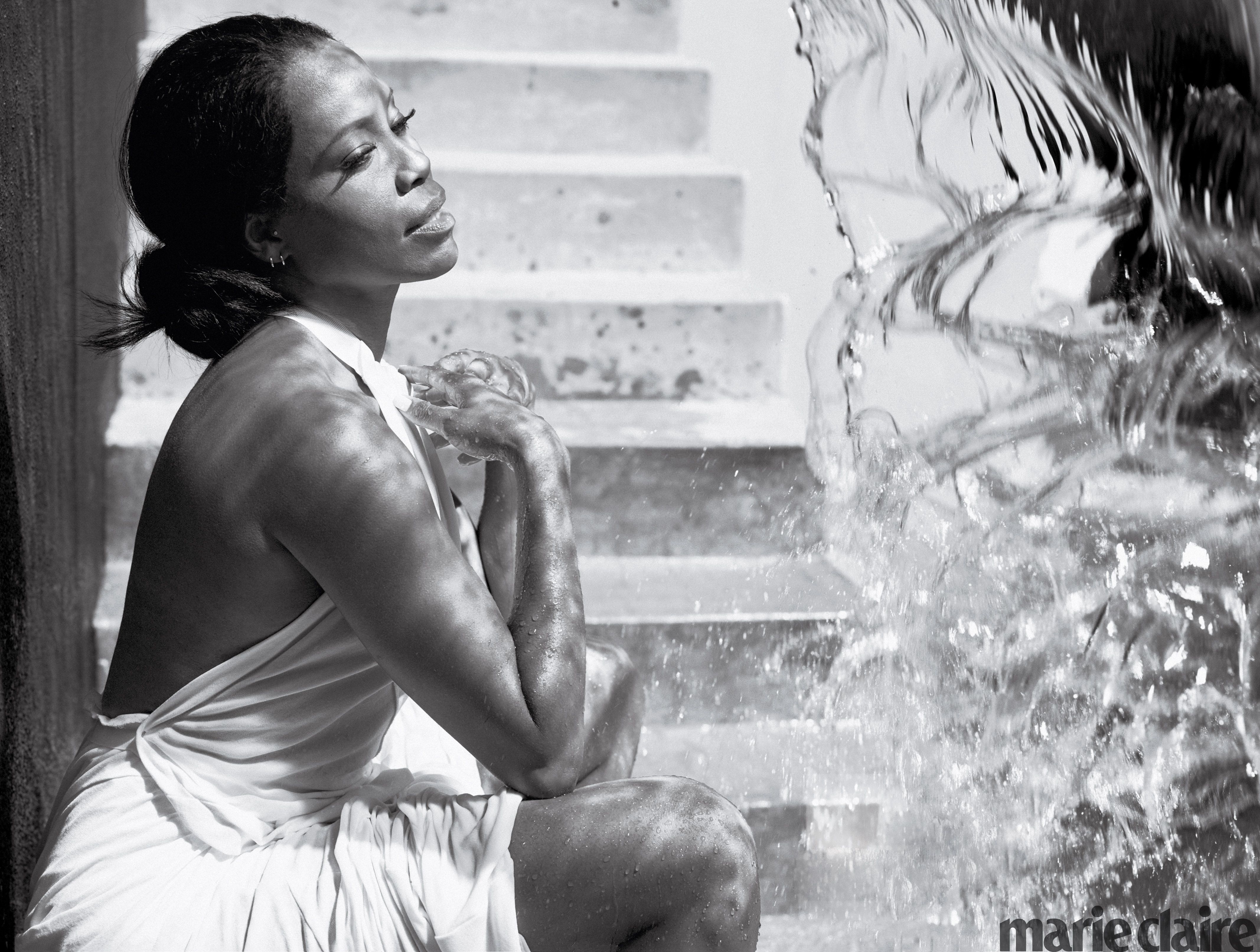
Unravel Project dress, Mateo New York earrings.
That she cares deeply about family is clear. Look who accompanies her to award shows (her son and mother); who runs her production company, Royal Ties, which has a first-look deal with Netflix (her sister); and the roles she has chosen to play: Marcee Tidwell in Jerry Maguire, Sharon Rivers in Beale Street, even Cecily Banks in Mighty Joe Young. “That mama bear,” says King. “Even women who don’t have children, we still have that. It is nature, you know? That protective thing.”
But added public attention changes things. Think back to the Golden Globes. On stage in a shimmering pink Alberta Ferretti column dress after winning a best supporting actress statue, King made the following promise: “I’m going to use my platform right now to say, in the next two years, I am making a vow—and it’s going to be tough—to make sure that every-thing that I produce [is going to be] 50 percent women, and I just challenge anyone out there who is in a position of power, not just in our industry [but] in all industries, I challenge you to challenge yourselves and stand with us in solidarity and do the same.”
The only part of that speech that people seem to remember is the vow—not the challenge. Some journalist is always asking her what she’s doing to make her pledge come true. “Have you seen an announcement of me producing something yet?” she constantly finds herself saying. “That speech was six months ago. Goddamn.” This is the double standard that most often rears its head when it comes to women of color. “I’m held to account. Not having as many of the opportunities or resources as a white man or a white woman in the industry, but now that I’m the one that’s decided to say that I’m going to use what I’ve been given to do more, it needs to have been done yesterday?”
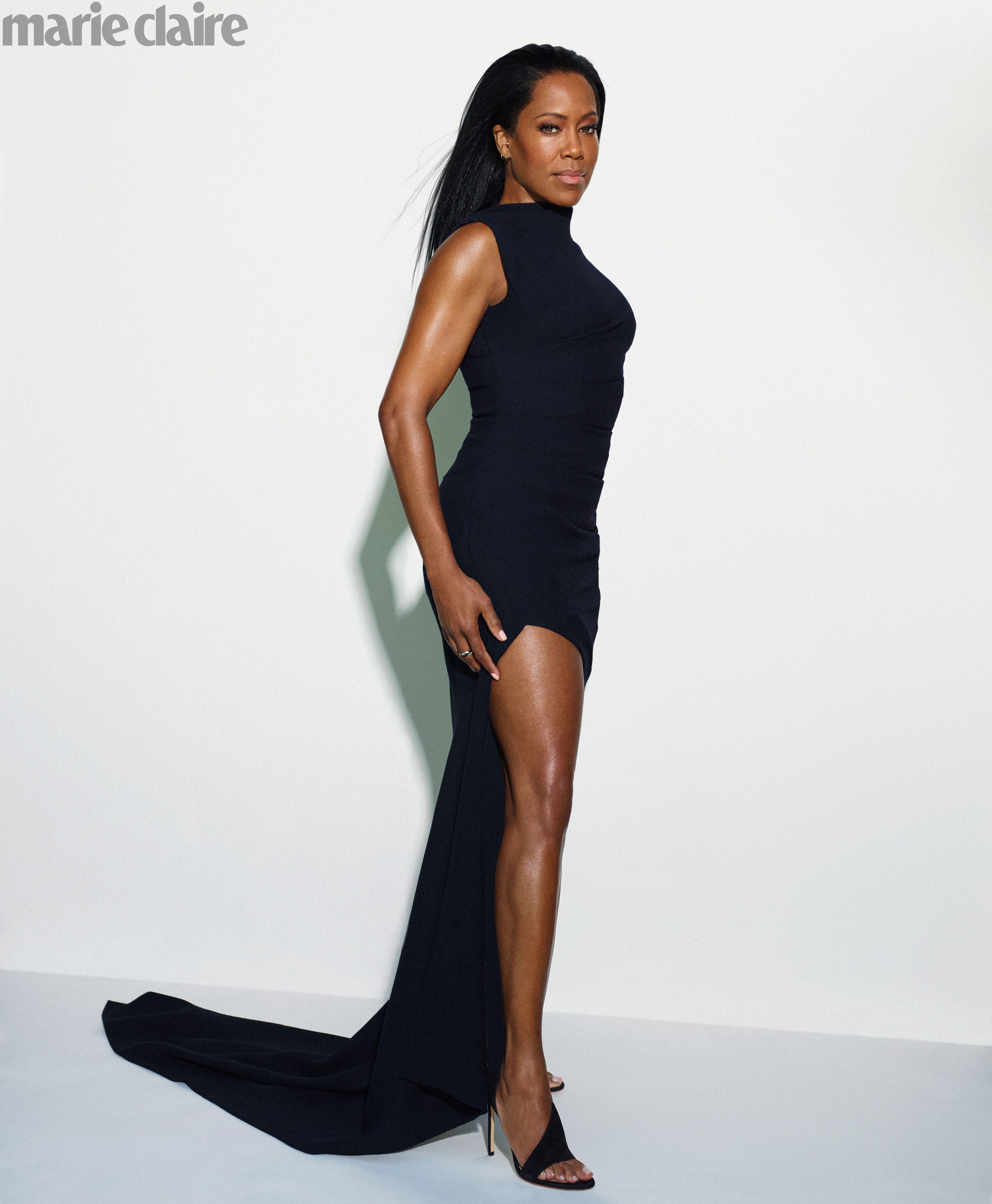
Monse dress, Mateo New York earrings, Cartier ring, and Francesco Russo shoes.
This has made her more reticent. I ask her about her activism, something that has mattered to her as far back as 2010, when she tested publicly for HIV/AIDS to encourage others to get tested. She’s had things to say about Me Too and unequal pay, but after her “overshare,” she’s hesitant. “I feel like, um—hoo, let’s see if I don’t over-share again.” She says she’s lent her name to causes, but it’s hard to be consistent. As if I can read her mind, she says, “The ... the long fight, the long run, you know what I mean?”
I do and I don’t. There’s a contradiction here. King’s often said she believes in standing for truth, but in Hollywood and beyond, the price of truth-telling for a woman trying to gain more power to make change is high. “Turn the other cheek? I don’t quite believe that. I do believe that sometimes you’re supposed to turn the other cheek, sometimes they’re supposed to get smacked back, sometimes they’re supposed to get knocked the fuck out, you know? And taking that moment to assess the situation will help you.”
She has just returned to L.A. after a year in Atlanta, where Watchmen was filmed. Before our interview, she’d disconnected for more than a week, warning her team, “If you think something’s the chance of a lifetime, it’s not. Don’t reach out.” Now she and Ian are “purging” their home, confronting boxes that have been sitting in the foyer for too long, collecting dust, getting in the way. She is clearing the path for the exhilarating surprise of whatever comes next.
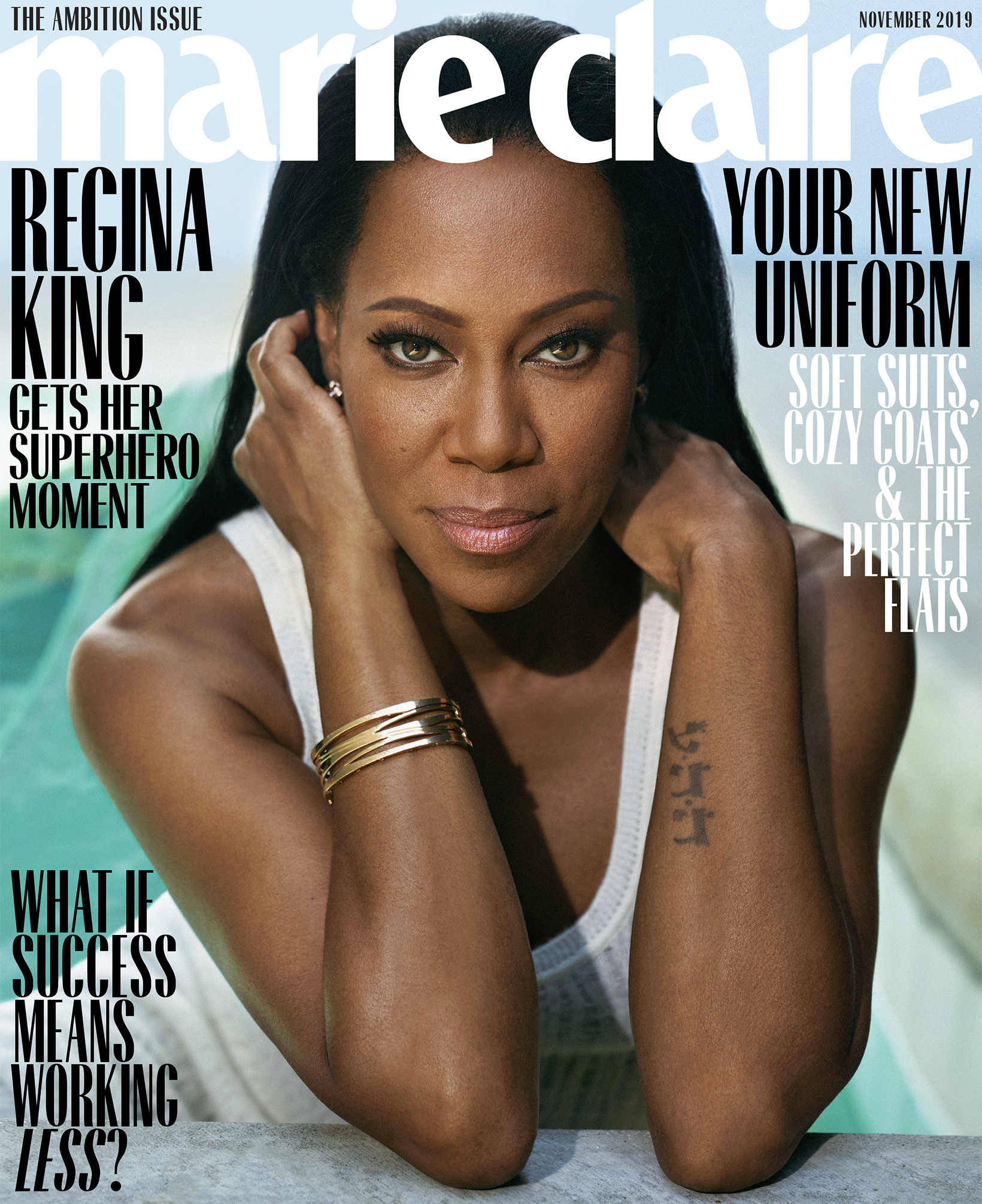
Gabriela Hearst dress; Bulgari earrings and bracelet.
This article originally appears in the November 2019 issue of Marie Claire.
Photographer: Thomas Whiteside / Fashion Editor: Memsor Kamarake / Hair: Philonese "Niecy" West for Golden Strands International / Makeup: Latrice Johnson / Manicure: Amanda Dean for Frenchies Woodbury / Set Design: Jacquelinne Cingolani / Production: Joy Asbury Productions
